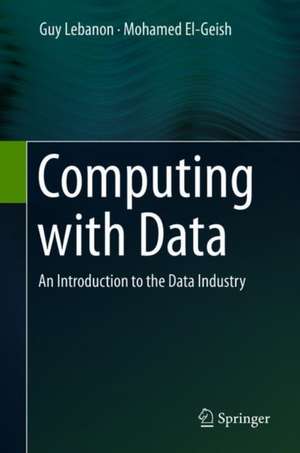Computing with Data: An Introduction to the Data Industry
Autor Guy Lebanon, Mohamed El-Geishen Limba Engleză Hardback – 10 dec 2018
The authors draw from their combined experience working at software and social network companies, on big data products at several major online retailers, as well as their experience building big data systems for an AI startup. Spanning from the basic inner workings of a computer to advanced data manipulation techniques, this book opens doors for readers to quickly explore and enhance their computing knowledge.
Computing with Data comprises a wide range of computational topics essential for data scientists, analysts, and engineers, providing them with the necessary tools to be successful in any role that involves computing with data. The introduction is self-contained, and chapters progress from basic hardware concepts to operating systems, programming languages, graphing and processing data, testing and programming tools, big data frameworks, and cloud computing.
The book is fashioned with several audiences in mind. Readers without a strong educational background in CS--or those who need a refresher--will find the chapters on hardware, operating systems, and programming languages particularly useful. Readers with a strong educational background in CS, but without significant industry background, will find the following chapters especially beneficial: learning R, testing, programming, visualizing and processing data in Python and R, system design for big data, data stores, and software craftsmanship.
Preț: 666.91 lei
Preț vechi: 833.64 lei
-20% Nou
Puncte Express: 1000
Preț estimativ în valută:
127.63€ • 132.75$ • 105.37£
127.63€ • 132.75$ • 105.37£
Carte tipărită la comandă
Livrare economică 15-29 aprilie
Preluare comenzi: 021 569.72.76
Specificații
ISBN-13: 9783319981482
ISBN-10: 331998148X
Pagini: 604
Ilustrații: XVII, 576 p. 104 illus.
Dimensiuni: 155 x 235 mm
Greutate: 1.01 kg
Ediția:1st ed. 2018
Editura: Springer International Publishing
Colecția Springer
Locul publicării:Cham, Switzerland
ISBN-10: 331998148X
Pagini: 604
Ilustrații: XVII, 576 p. 104 illus.
Dimensiuni: 155 x 235 mm
Greutate: 1.01 kg
Ediția:1st ed. 2018
Editura: Springer International Publishing
Colecția Springer
Locul publicării:Cham, Switzerland
Cuprins
1 Introduction: How to Use This Book?.- 2 Essential Knowledge: Hardware.- 3 Essential Knowledge: Operating Systems.- 4 Learning C++.- 5 Learning Java.- 6 Learning Python and a Few More Things.- 7 Learning R.- 8 Visualizing Data in Python and R.- 9 Processing Data in Python and R.- 10 Essential Knowledge: Parallel Programming.- 11 Essential Knowledge: Testing.- 12 A Few More Things about Programming.- 13 Essential Knowledge: Data Stores.- 14 Thoughts on System Design for Big Data.- 15 Thoughts on Software Craftsmanship.
Recenzii
“The intended audience is too broad. ... readers looking for direction in the data industry will find the process useful.” (Serge Berger, Computing Reviews, October 11, 2019)
Textul de pe ultima copertă
This book introduces basic computing skills designed for industry professionals without a strong computer science background. Written in an easily accessible manner, it serves as a self-study guide to survey data science and data engineering for those who aspire to start a computing career, or expand on their current roles, in areas such as applied statistics, big data, machine learning, data mining, and informatics.
The authors draw from their combined experience working at software and social network companies, on big data products at several major online retailers, as well as their experience building big data systems for an AI startup. Spanning from the basic inner workings of a computer to advanced data manipulation techniques, this book opens doors for readers to quickly explore and enhance their computing knowledge.
Computing with Data comprises a wide range of computational topics essential for data scientists, analysts, and engineers, providing them withthe necessary tools to be successful in any role that involves computing with data. The introduction is self-contained, and chapters progress from basic hardware concepts to operating systems, programming languages, graphing and processing data, testing and programming tools, big data frameworks, and cloud computing.
The book is fashioned with several audiences in mind. Readers without a strong educational background in CS--or those who need a refresher--will find the chapters on hardware, operating systems, and programming languages particularly useful. Readers with a strong educational background in CS, but without significant industry background, will find the following chapters especially beneficial: learning R, testing, programming, visualizing and processing data in Python and R, system design for big data, data stores, and software craftsmanship.
Computing with Data comprises a wide range of computational topics essential for data scientists, analysts, and engineers, providing them withthe necessary tools to be successful in any role that involves computing with data. The introduction is self-contained, and chapters progress from basic hardware concepts to operating systems, programming languages, graphing and processing data, testing and programming tools, big data frameworks, and cloud computing.
The book is fashioned with several audiences in mind. Readers without a strong educational background in CS--or those who need a refresher--will find the chapters on hardware, operating systems, and programming languages particularly useful. Readers with a strong educational background in CS, but without significant industry background, will find the following chapters especially beneficial: learning R, testing, programming, visualizing and processing data in Python and R, system design for big data, data stores, and software craftsmanship.
Caracteristici
Links to an online, user-friendly website to edit and run the book’s plethora of code examples Presents principles that can be employed in applications ranging from software simulations to real-world web applications that serve millions of users Explains prevalent programming languages and data processing systems that are commonly used to address engineering challenges Introduces programmers to data science concepts and practices through new apparatuses such as R programming and data processing techniques Explores new tools and libraries to use in big data projects Helps readers to hone their skills and introduces new skills necessary to be a more productive data scientist, analyst, and engineer
